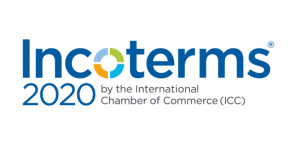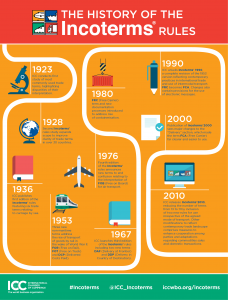 On September 20, 2019, the International Chamber of Commerce, ICC, published the latest Incoterms update.
On September 20, 2019, the International Chamber of Commerce, ICC, published the latest Incoterms update.
The International Chamber of Commerce has been publishing Incoterms rules for over 80 years, reviewing them every 10 years to keep up with new market technologies and innovations, to better represent new business practices, facilitating and making negotiations more accessible.
Incoterms, known worldwide and translated into 30 languages, define the responsibilities of the exporter and importer at each stage of the import / export process, transferring the ownership of the material.
They provide importers, exporters, attorneys, carriers, insurers and students from the international arena with rules and guidelines that reflect the latest developments in the business environment, aligning different levels of insurance coverage, including transportation arrangements, such as modal, safety-related requirements, transportation obligations and costs, among other points.
According to ICC Secretary General John W.H. Denton:
The Incoterms 2020 rules make business work for everyone, facilitating trillions of dollars in global trade annually. Because they help importers and exporters around the world understand their responsibilities and avoid costly misunderstandings, the rules form the language of international sales transactions and help build trust in our valuable global trading system.
The updated Incoterms 2020 list contains the rules for 11 Incoterms. They have already been published and will be effective on January 1, 2020. Therefore, their use is suggested from that date. If importers / exporters wish to consider the Incoterms 2010, this should be added to the documents (eg EXW Incoterm 2010)
Here is the updated list:
1- EXW – Ex Works – At the source, at the given location. It represents the minimum obligation for the exporter.
2- FCA – Free Carrier – Free at the carrier at the specified place of delivery. It is now accepted for sea transportation provided it is in container. In addition, BL will now be released on board and terminal shipping will be accepted.
3- FAS – Free Alongside Ship – Free by the ship at the specified port of embarkation. Incoterm used for loose cargo, ie it is not required to be in a container.
4- FOB – Free On Board – Free On Board at the given port of embarkation. It can also be used in cabotage.
5- CPT – Carriage Paid To – Transportation Paid To Destination
6- CIP – Carriage And Insurance Paid To – Paid transportation and insurance to specified destination. It is now possible to negotiate insurance. In the incoterms of 2010, insurance was 10% of the value of the merchandise, now it can be any value, 20%, 45%, 60,%, and so on.
7- CFR – Cost And Freight – Cost and freight at the designated port of destination. Commonly referred to as FOB + Freight and can only be used for sea and cabotage shipments.
8- CIF – Cost Insurance And Freight – Cost, insurance and freight at the designated port of destination. Like insurance, freight cost can now be negotiated, not exempting the exporter from providing it, which remains mandatory. .
9- DAP – Delivered At Place – Delivered to the given destination location. Exporter fulfills the obligation to deliver the unloaded goods to the place of destination.
10- DPU – Delivered At Place Unloaded – Delivered to the specified destination landing location. It forces the exporter to unload cargo at the importer’s destination.
11- DDP – Delivered Duty Paid – Delivered duty paid at the specified destination. Unloading can be negotiated, which does not guarantee that it will be accepted, but the goods must be cleared for importation at the designated place.


